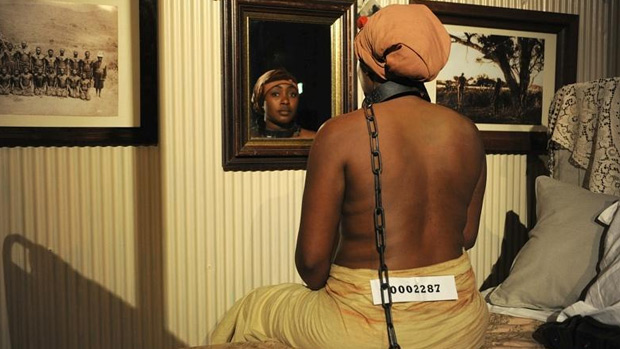Exhibit B: were protesters right to shut down 'human zoo'?
Barbican exhibition closes as protesters brand Exhibit B 'racist' and blockade entrance

A free daily email with the biggest news stories of the day – and the best features from TheWeek.com
You are now subscribed
Your newsletter sign-up was successful
An art exhibition featuring black performers in chains has been cancelled after protesters blockaded the entrance on its opening night.
The Barbican's Exhibit B, inspired by 19th-century human zoos, was due to open at The Vaults beneath Waterloo Station on Tuesday night, but up to 200 protesters broke through barriers to block access to the London venue.
Staff cancelled the whole five-day run, saying it had become "impossible" to continue because of the "serious threat" to the safety of performers, audiences and staff.
The Week
Escape your echo chamber. Get the facts behind the news, plus analysis from multiple perspectives.

Sign up for The Week's Free Newsletters
From our morning news briefing to a weekly Good News Newsletter, get the best of The Week delivered directly to your inbox.
From our morning news briefing to a weekly Good News Newsletter, get the best of The Week delivered directly to your inbox.
Exhibit B, which features live models portraying African slaves, human zoo specimens and asylum seekers, sparked controversy long before its opening night in London.
A Boycott the Human Zoo campaign was set up by activist Sara Myers from Birmingham, who attracted nearly 23,000 signatures for her online petition to have the exhibition withdrawn. Myers branded the show an "outrageous act of complicit racism" and said she was delighted that it had been shut down.
But other performers said the exhibition by white South African Brett Bailey had been "censored" by people who had not seen it or understood its intentions.
"To call it racist is insane," Stella Odunlami, a black British actress from east London, told The Times. "It looks at the tools that were used to degrade and humiliate people. Brett Bailey has every right to tell that story."
A free daily email with the biggest news stories of the day – and the best features from TheWeek.com
Writing in The Guardian, Bailey himself insists the intention of Exhibit B was "never hatred, fear or prejudice" but says that it "demands that we interrogate dehumanising stereotypes of otherness". He believes the protesters have challenged his right as a white South African to speak about racism in the way he does.
"Do any of us really want to live in a society in which expression is suppressed, banned, silenced, denied a platform? My work has been shut down today, whose will be closed down tomorrow?"
The Barbican said it too was "disturbed at the potential implications this silencing of artists and performers has for freedom of expression" and insisted Exhibit B "raises, in a serious and responsible manner, issues about racism".
The Times was among several newspapers to review the exhibition at the Playfair Library Hall in Edinburgh, praising it as "an unsettling reminder of colonial exploitation". The Guardian described it as "both unbearable and essential", while the Evening Standard called it "disturbing but powerful".
The Daily Telegraph's Laura Barnett said it was "impossible not to be sickened by accounts of the cruelty meted out by white colonial forces, and the concept of the living sculpture is a powerful one". However, she did suggest that it was "verging on the kind of voyeuristic spectacle that Bailey has set out to critique".
Today, Rich Juzwiak at Gawker says the content of Exhibit B is "detestable" but the worth of Bailey's work is evident in the dialogue it has provoked. "It has made so many people think so much, and to discontinue it is to disallow thought."
-
 El Paso airspace closure tied to FAA-Pentagon standoff
El Paso airspace closure tied to FAA-Pentagon standoffSpeed Read The closure in the Texas border city stemmed from disagreements between the Federal Aviation Administration and Pentagon officials over drone-related tests
-
 Political cartoons for February 12
Political cartoons for February 12Cartoons Thursday's political cartoons include a Pam Bondi performance, Ghislaine Maxwell on tour, and ICE detention facilities
-
 Arcadia: Tom Stoppard’s ‘masterpiece’ makes a ‘triumphant’ return
Arcadia: Tom Stoppard’s ‘masterpiece’ makes a ‘triumphant’ returnThe Week Recommends Carrie Cracknell’s revival at the Old Vic ‘grips like a thriller’